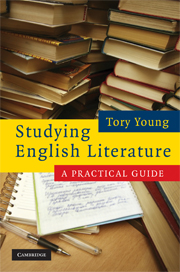Chapter 3 - Argument
Published online by Cambridge University Press: 05 June 2012
Summary
Having something to say
Sometimes students become so preoccupied with the format of essays – writing an introduction and a conclusion – that they forget the essay's main purpose: it must have something to say on a particular subject. And ironically, the more you struggle with essays, the more likely you are to be directed away from the topic and the discipline of Literature towards a non-subject-specific guidebook or to generic study-skills classes where formulae for writing good essays are demonstrated. But however well-versed you become in the structure of essays – introduction, middle, conclusion, bibliography – unless you actually have something to say, your essay will never succeed. Readers might forgive an abrupt ending or a referencing error if you offer some interesting perspectives; focusing instead on the format and conventions of essays, in diverting your attention away from their content, can be positively detrimental. Since the French Renaissance scholar Michel de Montaigne (1533–92) entitled his 1580 book Essais, the term ‘essay’ has come to denote a polished composition on a topic, losing an earlier meaning that is very helpful to writers. Originally an essay was not a finished treatise but an attempt or an endeavour (an assay). Returning to this meaning, with its emphasis upon the discussion of a subject rather than a masterful verdict upon it, should help alleviate some of the anxiety experienced when approaching an essay.
- Type
- Chapter
- Information
- Studying English LiteratureA Practical Guide, pp. 48 - 78Publisher: Cambridge University PressPrint publication year: 2008



